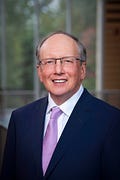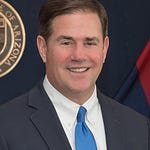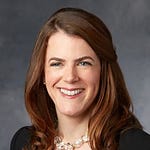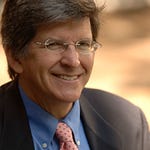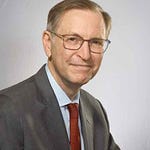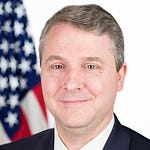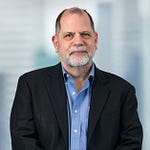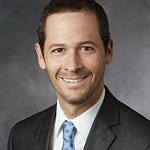Morris Kleiner, the AFL-CIO Chair in Labor Policy at the Humphrey School of Public Affairs at the University of Minnesota and arguably the world's leading authority on occupational licensing, joins the podcast to discuss how he became an economist, the origins of occupational licensing in the 19th and 20th centuries, how since WW2 it's become a major barrier to economic opportunity in the U.S., and how there is some hope for a growing tide of policy initiatives in the early 21st century seeking to relax occupational licensing regulations.
Jon: “This is the Capitalism and Freedom, the 21st Century Podcast, where we talk about economics, markets, and public policy. I'm John Hartley, your host. Today I'm joined by Morris Kleiner, who is the AFL-CIO Chair in Labor Policy at the Humphrey School of Public Affairs at the University of Minnesota. Morris is a labor economist and the world's leading authority on occupational licensing, which he studied for decades as an economist. Welcome, Morris.”
Morris: “Well, thank you. I'm delighted to be with you.”
Jon: “I want to start by talking about your origin story. You were born in a displaced persons camp in Germany after World War II. Both your parents were Holocaust survivors. Tell me about your whole story of growing up and your family's story and how you came to America. You almost came to Canada. Tell us a little bit more about your origin story.”
Morris: “Glad to. My origin started at a very low level. My father, who was in Poland and lived in a very small town, he was Jewish, and when the Holocaust survivor started, he tried to escape. But when Germany invaded Russia, he came back to Poland and through a number of circumstances, one of which was they put his father in jail and said that they were going to kill him unless they got someone who was young at the time. He traded his life for his father, although it didn't, in the long run, didn't turn out well for his father, but was put into a work camp in a place called Stachowicz and then was shipped to Auschwitz and then finally to Dachau and he met my mother after the war and her whole family was murdered and they met in a displaced persons camp. If you've ever seen the Steven Spielberg saga of the liberation of the camps, my father was liberated at Landsberg and that's where they met and they came, they were fortunate, there was an opening to come to the United States. They took it, my father worked as a laborer, made mattresses in Peoria, Illinois, and was very happy to be in the United States, especially given the very difficult life and things started out for him. And I grew up in Peoria and things turned out well for me, went to school, first person in my family to go to college and fortunate enough to get funding and also my wife Sally was a huge help throughout my academic career. Went to the University of Illinois, got a PhD in economics, and then went to the University of Kansas, spent time in DC at the Brookings Institution and at the Department of Labor. And following that, I got a position at the University of Minnesota in 1987, and have been there ever since, and have really enjoyed my time as an academic and being at the University of Minnesota.”
Jon: “That's fantastic and an amazing story, and I'm so sorry about your parents' family. It's really just one of the worst tragedies in all of human history. I'm curious, like, since you also served in the U.S. military, too, tell us a little bit about that and how you got it, like, what got you interested in labor economics to begin with and in occupational licensing, which you're very well known for, and I think, you know, you're the single, you know, leading authority on occupational licensing. I'm curious, how did that all happen?”
Morris: “Well, it happened when I was at the Brookings Institution. I was farmed out to the Department of Labor, and I was the new person at the Department of Labor, and my boss called me in and said, we have this project. Some congressman wants to know about occupational licensing. You're the new kid on the block. Wow, I'm giving this to you. And I said, what had I done to him to get this terrible assignment? And I started getting into it, found out how interesting it was, saw that Milton Friedman had thought it was a very important issue, and got into it, and I was also, by the way, doing a lot of work with a number of colleagues, including Richard Freeman at Harvard, who really piqued my interest in collective bargaining, labor relations, and I really saw a lot of very close parallels between what happens with labor unions and what they do, and what happens with occupational licensing. So, it was very much a parallel type of analysis to look both at collective bargaining unions and what they do with respect to, in one case, raising wages, as occupational licensing does, and what it does for prices and consumers.”
Jon: “Well, I mean, it's so interesting. Milton Friedman wrote his doctoral dissertation on this topic of occupational licensing, and he wrote about this in the early 20th century. He famously, I think, later talked about doctors and how doctor licensing, physician licensing, sort of made doctors almost as if they were sort of unionized, in a sense. But I'm curious, like, what is your understanding of how Milton Friedman's dissertation came about? And I know, like, I think, famously, the American Medical Association sort of tried to block his publication. Dissertation, he turned into a book, which turned into something that was co-authored with, I think Simon Kuznets, who was his advisor at Columbia, and then they published that, I think, called Incomes from Independent Professional Practice. But it's amazing because, you know, he was writing about it then when, I think, occupational licensing as a macro issue was a lot smaller. As unionization has become less and less popular, you know, fewer unions, fewer union members across the U.S., occupational licensing has, you know, quickly risen, become, I think, the largest sort of labor institution in the U.S. You know, about 25%, I think, or so, of all workers in the U.S. have some sort of occupational license. Meanwhile, in this group from probably, you know, maybe single digits or around there in sort of 1950, whereas in, like, 1950, probably a third of the U.S. labor force was unionized, and that's dropped to, I think, less than 10%. I'm curious, like, what do you think about this sort of macro trend? And you've been following it very closely, following many professions. One, how did you get interested? Like, was it really Friedman that, like, got you interested in occupational licensing? And what, like, what do you think are the big issues in occupational licensing? What do you think has contributed to its rise over the past, say, 70 years or so?”
Morris: “Well, I hate to disappoint you, but what got me interested in occupational licensing was my boss assigning me this topic. But I really found the work as a result of that, and it was a serendipitous event. But I found Milton Friedman's work. I found it very compelling and very interesting. I was fortunate enough to be asked to write for an Oxford University Press book dealing with Milton Friedman's contributions to economics, and I was asked to write the chapter on occupational licensing. But as you correctly point out, licensing grew from about 1 in 20 workers to now one in four workers to now one in four workers have attained, and that's the difference between coverage and attainment. It may be sort of in the weeds. Coverage is engineers, so every engineer is covered by a law, but less than half, probably closer to one in four engineers, have actually gotten an occupational license, similarly with accountants. But the numbers that are used is, yes, about one in four workers have attained an occupational license, but many more are covered by a license. And why has this happened? Why is the current period different than the period right after World War II? Part of it is really structural shifts. And after World War II, the dominant employer was in manufacturing, so you had General Motors, Ford, Chrysler, and those workers didn't need an occupational license. The employer chose who they wanted. But since that time, there's been a real structural shift to services, and that if you're a steel worker in 1950, and now you're a personal trainer, the personal trainer needs a license, where the steel worker didn't. And that's been a large part of the shift from manufacturing to services, and manufacturing to unions dominated. In services, what has taken the, substituted for unions, has been occupational licensing.”
Jon: “Now, occupations that are, that require licensing, they typically skew towards the lower end of the income distribution. Is that sort of a good generalization to make?”
Morris: “Well, certainly there are occupations both at the lower and higher end. So, at the higher end, you think of the traditional ones that were licensed after the Civil War. So, doctors, dentists, and the 1920s nurses. So those are the high-end occupations. More recently, following World War II, it has been the lower-income occupations. So, there's development of new occupations, like dental hygienists, like physicians’ assistants, like nurse practitioners. All those are evolving occupations, and when the sort of, the way licensing develops, you get a number of people who are doing the same thing. They get together, they form an organization, they tax their members, they take those taxes, and then lobby the legislature or the governor. And the U.S. licensing is really a state-by-state role, so that about 80% of all licenses are at the state level. And the organizations lobby the legislators and the governors, and if they're successful, which many have been in the post-World War II period, they establish an occupational license for that occupation, which says only people who have government positions and can use the police powers of the state can work for pay in that occupation.”
Jon: “So, I think there is a sense in the policy sphere that there is an excessive amount of occupational licensing, and you hear about certain professions, for example, that may not even be necessarily the most high-skilled jobs out there, you know, nail technicians or braiders, for example, or hairdressers that don't necessarily need significant amounts of training but are licensed and have state licenses that also don't necessarily recognize in other states. So, if you're a nail tech or a hairdresser in, say, Maryland, in your license there, you may not be able to actually go work in, say, Virginia, one state over. Is that a big macro trend in occupational licensing? I'm curious what your thoughts are on the idea that occupational licensing has grown so far that it's actually, one, having negative consequences in the labor market in terms of labor mobility and people actually just trying to find work. I'm curious what your thoughts are on that criticism of occupational licensing growing a bit too far.”
Morris: “Well, certainly, and the groups that really need to focus or try to get monopoly rights more recently have been these lower-level occupations. So, in order to become a cosmetologist in most states, you need 1,500 hours of classwork and or practicum. That's more hours than it takes to get a law degree in most states. And what has happened as occupations have grown in terms of their ability to restrict entry is the people you don't see. That is, who would like to be a cosmetologist? Who would like to be a horse-tooth filer? Who would like to be someone who is an interior designer in some states? What does it take for these individuals to enter the occupation? And if there are barriers, it takes time in terms of going to a school that prepares you for the exam. It takes money. It takes time away from your current job, and this restricts especially low-income individuals from entering the occupation and, as you mentioned, the ability to move across state lines. More recently, there's been pushback, and there are about 10 to 15, depending on how you mention it or depending on how you cut it up, there are many states that are reducing the barriers to move across state lines. So, this has been a real push over the last several years, and it's been a push that's been supported by the last three presidents. The last three presidents have signed executive orders suggesting that occupational licensing has gone too far. And many states, the governors, starting with the state of Arizona, have said that if you move to Arizona and you have an occupational license in another state and are a resident of Arizona, you can immediately practice that occupation. So, there's really been a push back to try to reduce some of these barriers, both to entering the occupation, which are substantial, and the ability to move across geographic borders in order to work in an occupation.”
Jon: “So I think there's like, what, 13 states now, maybe, that have embraced reciprocal, universal reciprocal position that Arizona is taking, where anyone who has a license from another state can use that license in states like Arizona or I think even Pennsylvania. So, I think there's been, I think most of the states are somewhat Republican, but I think not all. I think it is a bipartisan issue. States like purple states like Pennsylvania have jumped on this as well. I'm curious, I guess sort of to take the other side of this on licensing and the sort of, I think the textbook rationale for licensing has always been that we, it's always been an information economics type argument where there is asymmetric information and in the labor market, you don't necessarily know if you didn't have any licensing who would be a good doctor or a bad doctor. And so, you know, we need licensing to establish some sort of a minimum quality standard. And I'm curious if we were to sort of go back to blank piece of paper, sort of start from the beginning of, you know, and imagine that there weren't any licensing regimes out there, like how would you think about what occupations should be licensed and what ones shouldn't? I'm curious what your thoughts are on this sort of minimum quality standards type of information economics, information asymmetry, thinking that usually gets applied to this issue of licensing.”
Morris: “Well, we started out with that way, right after the civil war in the U.S., almost no one was licensed. There were very few occupations, including doctors. So, the issue for consumers is, was, and which they promoted to their legislatures, is you can't tell if someone is a good doctor versus a snake oil salesman. So how do you, and especially for something like health, how do you determine whether someone has the credentials or the knowledge to provide these services? So, the first group of occupations that were licensed after the Civil War up to the 1920s were occupations that were risky. That is, risky both for the person to enter and risky for the consumer. So, you saw the initial kinds of occupations that became licensed were the ones that had the risk, that had a lot of human capital associated, dealing with people. These were all the occupations that initially became licensed. In economics, it was called the public interest, that these were occupations where there was risk to the consumers and risk to the practitioners, and they were the first ones to become licensed. Over time, that has sort of shifted to a public interest application of licensing. So, you've seen more recently, occupations are, as I explained, got together and lobbied the legislature and the governor to say that we really need these occupations, and the public interest rationale, although it's trotted out, has been less important than the public choice view that these are, that there are more negatives relative to positives in dealing with occupational licensing, and that has certainly been the case post-World War II.”
Jon: “It's so interesting, the history of medicine, and something of interest. You go back to the late 19th century, in the 1800s, there were a lot of different physician groups that were sort of appearing, and some were sort of considered quacks, and things like bloodletting, and all sorts of things were sort of going on, but what was interesting is after things like the Flexner Report and things like that, there were basically only two groups of schools of thought of physicians that were allowed to continue to exist, the allopath’s and the osteopaths, and to this day, they're the two major types of doctors and medical schools in the U.S. You have MDs who are the allopath’s, and the DOs who are the osteopaths, and they're generally the same, but some people will tell you that there's some differences. I think DOs are more holistic sorts of things, but it's interesting thinking about now just how 100 years later, the types of doctors and physicians that we have are still sort of influenced by those key sort of occupational licensing decisions that were made 100 years ago. Now, just flash forward to the COVID crisis, there was a lot of interesting things that were being done at that time when it came to temporary licensing. And I’m curious what your thoughts were on this. Obviously, COVID was a huge crisis and very unexpected for a lot of people. I remember during certain parts of COVID, during the earlier parts when there were shortages of nurses and medical professionals and doctors in places like New York City and New York State, there were changes that were made that allowed, for example, I think medical students to, for example, get more involved in things that they would otherwise not be able to. There was also, I think, some sort of reciprocity that allowed out-of-state doctors to move around. I'm curious, like, has that, in your mind, sort of contributed to sort of a shift in some of the thinking around maybe some of these occupational licensing are, and certainly the fact that you can't move across states without having to do all sorts of more training as a licensed worker. Do you think that any of this has sort of shifted the needle on people's thinking around licenses, or I'm curious, like, who you think the big enemies are of licensing reform in general?”
Morris: “Well, I think you very appropriately bring out the issue of what we called battlefield commissions. So respiratory therapists, as you alluded to, or other physicians who had not passed a licensing exam were allowed to, were issued temporary licenses during COVID and allowed them to practice. Individuals who were nurses who were retired and had let their licenses lapse were brought back into the fold to take care of very sick patients. So, this was really an issue that the exogenous shock of COVID really had a significant effect on licensing. And many governors allowed individuals who were not fully licensed to work, but they were temporary licenses. So once COVID started to wane, these individuals were not allowed to work, and their temporary licenses lapsed, and they had to go through the full licensing procedure. The only state that was an exception to that was Massachusetts that allowed a number of occupations who had these battlefield commissions to continue practicing. What effect that has had on licensing, certainly since COVID, there's been a large relaxation of occupational licensing criteria. Perhaps the biggest example is, as we've discussed, the ability to move across state lines and the number of states that have allowed individuals to move to their state, and they have accepted their license largely, not fully. There are all sorts of exceptions, and the occupations really have started to push back. That is, they said that individuals who come from a state that don't have the high standards that we do, that they will put barriers, that is, they must meet the requirements of the state they're moving to, or equivalent to those standards, in order to work. So, yes, there's been a relaxation, but perhaps not as much as perhaps some people have wanted. And you are getting the pushback from the professions. I started out this conversation by talking about unions and perhaps the power that they might have in the legislature. They are weak compared to groups like lawyers, doctors, dentists, barbers, cosmetologists. They have a lot more weight to throw around state legislatures than almost any union you could think of.”
Jon: “Well, it's amazing and so interesting to think about just how powerful some of these professions are in D.C. And, of course, a lot of them have their own offices and buildings there and are very active on Capitol Hill. I know, Morris, you're probably the most sought-after person that comes to occupational licensing policy across states and in Washington, D.C. I know you're in very, very high demand from policymakers. You're an academic, not only by training, but being a professor is your primary appointment. I'm curious about your thinking about where occupational licensing fits into labor economics and academia. I think maybe 30 years ago, one of the few people in academic economics, in labor economics, really focused on occupational licensing. And since then, I think, thanks to a lot of your initial work, a lot of other labor economists have joined in. I think economists like Alan Krueger, I think Peter Blair, I think Evan Soltis and others. Are you excited to see all these young scholars jumping into occupational licensing? I'm curious of what your thoughts are on how occupational licensing is blossoming. In your mind, should more scholars be studying occupational licensing? In your mind, what are the areas that you think need more work to be done from an academic perspective on this issue? Morris: “Well, thank you for the kind remarks. I think, as Larry Summers would say, my father would have been very proud, and my mother would have actually believed it. So, thank you for the kind remarks. However, I'm really glad that there are a number of scholars who have taken up looking and examining the role of occupational licensing, both in terms of how it got started, how it evolved, and what its effects are. I think when you talk about licensing, it's also, I look at the numbers, I look at the models, and that's sort of my job as an academic. But it's also important to remember that these are people who are trying to get into, trying to find legitimate work, trying to become a barber, trying to become a cosmetologist, trying to become a plumber, an electrician. And it's how hard some of these barriers are in terms of trying to get into these occupations that will move them from the 10th percentile to the 30th or 40th percentile. And that these barriers really serve to limit their ability to make an honest living. So, I think that's what sort of motivates me. And I think just looking at the barriers and also just looking, what do we buy? Licensing, as Tom Sowell has always mentioned, that there are tradeoffs. That by putting these barriers, yes, people who are in the occupations make more money, but what happens to the people who couldn't get into the occupations? What are they doing? So, a lot of the work really ought to look at what happens to people who can't get into, get on the boat, get on the lifeboat with other people swimming around. I think that that's an important issue to think about. Also internationally, there's been much less work on occupational licensing in the European Union, in the Organization for Economic Cooperation and Development, in Southeast Asia, in China, in South America. There's very little that is known about the role of occupational licensing in these nations. So, I think it's really important for scholars, especially outside the U.S., to see if what happens in the U.S., that is, occupational licensing raises wages, it increases hours of work, and it restricts entry. And as a result, a lot of people who would like to work in certain occupations just can't do it.”
Jon: Well, it's amazing. It's so exciting hearing about all these avenues for future research for economists to do. And hopefully, some will come along and pursue, if not yourself, Morris, because I feel like you're so prolific in all your occupational licensing work that you're doing, continuing to do. It's so exciting, and hopefully we'll have more answers on these issues soon. And it'll be interesting to see how occupational licensing policy evolves across states in the decades to come, and whether or not maybe there will be some reversal in just how tight occupational licensing regulation has become. It's a real honor to talk to you, Morris. You've been a real trailblazer in labor economics, in really starting this field of studying occupational licensing and its labor market consequences. I want to thank you so much, Morris, for joining us today on the podcast.”
Morris: Well, thank you very much for having me. Really appreciate the opportunity to talk to you and to your listeners.”
Jon: “Thank you so much, Morris. Today, our guest was Morris Kleiner, who is the AFL-CIO Chair in Labor Policy at the Humphrey School of Public Affairs at the University of Minnesota. This is the Capitalism and Freedom in the 21st Century podcast, where we talk about economics, markets, and public policy. I'm John Hartley, your host. Thanks so much for joining us.”

